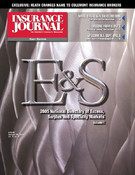Banks should have an easier time selling insurance in Massachusetts thanks to a recent federal court ruling granting supremacy to federal rules over more restrictive state laws governing banks’ sales of insurance products.
The Massachusetts Bankers Association successfully challenged state laws that they said interfered with a bank’s ability to sell insurance.
The provisions at issue prohibited banks from paying referral fees to non-licensed personnel; restricted when a bank employee could refer a customer to the bank’s insurance division; imposed a waiting period after a loan application before a bank could offer insurance; and required a physical separation of a bank’s insurance sales operation from its tellers and other services.
The case centered on whether the four challenged provisions “prevent or significantly interfere” with the ability of banks to sell, solicit or cross-market insurance, which is the legal standard as set forth in the Barnett Bank case in defining the pre-emptive scope of statutes and regulations.
“We think this decision is a good opportunity for consumers as well as for banks, who can sell insurance now without one hand behind their backs,” Daniel J. Forte, president of the Massachusetts Bankers Association, told the Associated Press.
The defendants in the case were the state insurance and banking commissioners. They had argued that the federal Gramm Leach Bliley Act that removed many of the separations between banking and insurance did not pre-empt state laws governing how federal banks could sell insurance in Massachusetts.
“We’re disappointed and we’ll take a look at our options in the very near future,” said Chris Goetcheus, a spokesman for Office of Consumer Affairs and Business Regulation, which oversees the divisions of banking and insurance.
Agents concerned
Independent insurance agents, who backed the restrictions on bank activities, are concerned over the decision because it “un-levels the playing field,” according to Daniel Foley, director of government affairs and general counsel for the Massachusetts Association of Insurance Agents. Foley says banks have the “implied coercion” of “the power of money” that agents do not have.
Foley also cited the advantage banks will have of now being able to pay non-licensed personnel or outsiders for insurance customer referrals, whereas insurance agents have been prohibited from paying non-licensed parties including car dealers and real estate agents for referrals. Foley says it remains to be seen whether agents will now be allowed to pay such referral fees as well.
Nearly 70 banks are licensed to sell insurance in Massachusetts but they have complained that the state laws severely restricted the way they could sell.
U.S. District Judge Ryan Zobel agreed, writing in his Jan. 10 decision that the federal Gramm Leach Bliley Act:
“We pretty much had a don’t ask, don’t tell policy,” Forte said, adding that the judge’s decision brings Massachusetts in line with most other states.
Zobel noted that Banknorth, with 121 branches in the state, did not refer a single Massachusetts customer to its insurance affiliates in the state during the first six months of 2003. Meanwhile, Banknorth branches in Maine, Vermont and New Hampshire referred thousands of customers to their insurance affiliates, despite having much smaller customer bases.
“The dismal number of referrals is clearly a result of the statutory structural impediments to cross marketing insurance products, which include the requirement that any solicitation attempt must capriciously rely on the customer initiating an inquiry,” the judge wrote.
The decision applies only to federally chartered banks, but Forte told the Associated Press he expects it to eventually apply to state chartered banks as well.
The federal Office of the Comptroller of Currency ruled in March 2002 that federal law pre-empted state law, but Massachusetts filed suit in the 1st U.S. Circuit Court of Appeals to set aside that ruling. In February 2003, the appeals court dismissed the state’s suit, suggesting that the issue would best be settled in trial court. The bankers association filed suit in August 2003.
No decision on whether the state insurance and banking officials would appeal the decision had been made by press time.
The case is Massachusetts Bankers Association, Inc., et al v. Julianne M. Bowler and Steven L. Antonakes, et al.
Topics Agencies Legislation Massachusetts
Was this article valuable?
Here are more articles you may enjoy.


 Longtime Alabama Dentist Charged With Insurance Fraud in 2025 Office Explosion
Longtime Alabama Dentist Charged With Insurance Fraud in 2025 Office Explosion  Chubb CEO Greenberg on Personal Insurance Affordability and Data Centers
Chubb CEO Greenberg on Personal Insurance Affordability and Data Centers  Maine Plane Crash Victims Worked for Luxury Travel Startup Led by Texas Lawyer
Maine Plane Crash Victims Worked for Luxury Travel Startup Led by Texas Lawyer  Married Insurance Brokers Indicted for Allegedly Running $750K Fraud Scheme
Married Insurance Brokers Indicted for Allegedly Running $750K Fraud Scheme 


